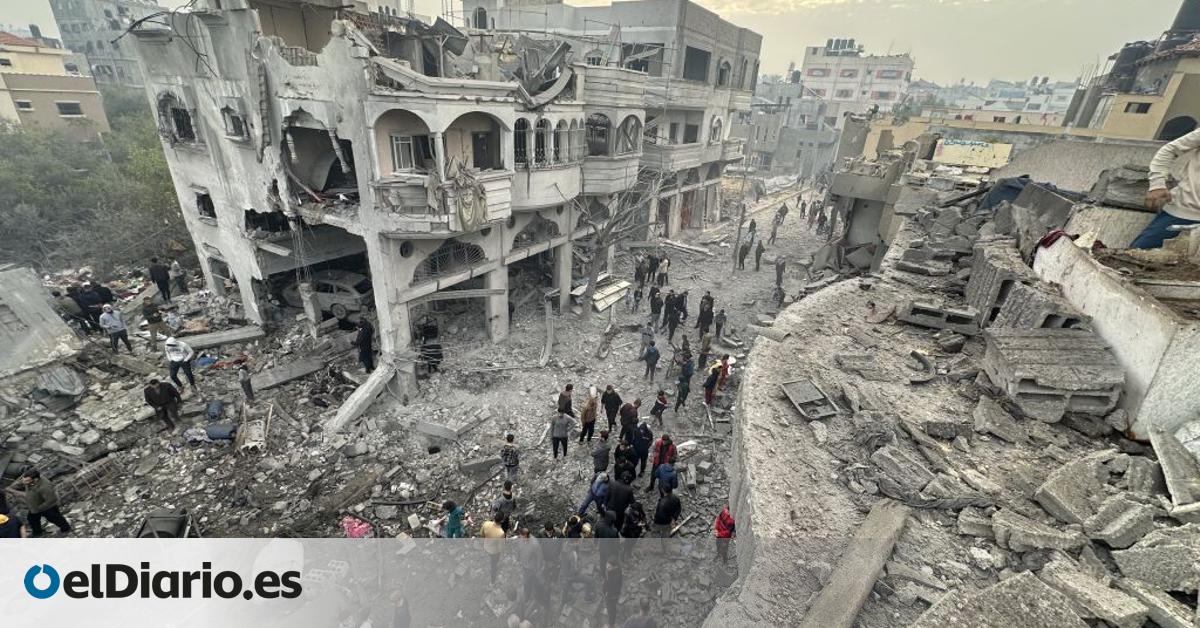
The wait has been agony. Half an hour after the ceasefire came into effect, initially scheduled for 8:30 a.m. local time, from the Israeli city of Sderot, just one kilometer from Gaza, columns of black smoke could be seen rising over Beit Hanun and They heard the shots of the last battles.
Minutes earlier, Israeli Prime Minister Benjamin Netanyahu had announced that the ceasefire would not begin until Hamas sent the names of the three hostages who will be released this Sunday, the first day of the truce. Hamas had stated that the delay was due to “technical problems” and, an hour and a half after the agreed time, it assured that it had delivered the list with the names of the three hostages. Israel has also confirmed its reception. Finally, the agreement came into force at 11:15 local time.
About a dozen people gathered at a viewpoint high above the city of Sderot to follow the latest bombings and the beginning of the ceasefire. From there, around nine in the morning, the drones could be seen flying over northern Gaza, as well as a large explosion very close to the border, in Beit Hanun. According to the Gaza Civil Defense, eight people have died from the bombings in the three hours of delay in the entry into force of the agreement. In 15 months of war, 46,913 people have died, according to the Gaza Ministry of Health.
“The Israeli Air Force is currently carrying out attacks against terrorist targets in the Gaza Strip,” the Army reported in a brief statement one hour after the agreed time for the ceasefire.
At half past six on Sunday morning, around 30 explosions were heard throughout the city. They were supposed to be the last bombings on the Strip.
In the four days since the agreement was signed until its entry into force, Israel has killed at least 122 people with in-extremis bombings, according to the Gaza Civil Defense, whose workers have continued to remove dead and injured people from under the rubble until last minute
Every Gazan has his “lottery ticket,” says lawyer Raji Sourani, who managed to leave the Strip a few months ago. With the added pain of having your number ring hours before the most anticipated ceasefire comes into force in 15 months of massacre, Sourani tells elDiario.es: “The last few days have been very bloody. On Thursday morning I lost Ihab, his wife and his two daughters. It is a very hard personal loss, he was like my son and he was my personal assistant. “The Israeli occupation has intensified the bombing and it is very hard because people are dreaming of a ceasefire.”
In the early hours of Friday to Saturday, an attack on the refugee tents of Al Mawasi, declared a humanitarian zone by Israel, killed five people from the same family, according to the Palestinian agency Wafa. In 15 months of punishment war and almost 47,000 deaths, the massacre has been uninterrupted. The bombs only fell silent for a week in November 2023 in a very brief ceasefire that collapsed on the eighth day. Despite last-minute tensions and difficulties over its implementation, this text, however, seems different.
The first phase of the agreement will last 42 days, during which Hamas will release 33 hostages. The first release will take place this Sunday, and the Islamist group will hand over three people. At the end of each week, if the ceasefire holds, the operation will be repeated until 14 hostages are freed in the last week. Meanwhile, Israel will allow an increase in the entry of humanitarian aid by 600 trucks a day – before the war 500 entered and the average for January this year does not reach 20 – as well as the return of the civilian population to the north of the Strip and a progressive withdrawal of the most populated centers. Finally, Israel will release 1,117 detained Gaza residents who did not participate in the October 7 attacks and 737 “terrorists” in Israeli prisons, according to public television. Among them there are dozens of minors.
“People will come back. [al norte] and you will find that you will have no house, no street, no school, no hospital, no water, no electricity, no sewage, nor your job,” says Sourani. The north has been the hardest hit area and, according to UN data, 90% of the houses have been damaged or destroyed. “Most families have lost loved ones. In addition to the dead, there are 30,000 missing. Alive, dead or imprisoned. “We don’t know anything about them.”
Regarding the entry of aid, the UN agency for Palestinian refugees, UNRWA, the main aid agency in Gaza, has expressed its “concern that UNRWA is prevented from working.” “Then the glue that holds the entire complex humanitarian operation together may not work,” one of its spokespersons told Al Jazeera. In October, Israel passed a law prohibiting UNRWA from operating in Israeli territory and areas under its control.
The second and third phases are aimed at the release of the rest of the living and dead hostages – there are currently a total of 98 -, a permanent ceasefire and the reconstruction of Gaza, and negotiations will begin within 15 days. “We urgently ask for quick agreements to ensure that all phases of the agreement are implemented and we emphasize that negotiations for the following phases must begin before the 16th,” the Forum of Families of Hostages and Missing Persons said in a statement this Saturday. “After 470 days with our relatives in the Hamas tunnels, we are closer to being reunited with our loved ones.”
Qatari Prime Minister Mohammed bin Abdulrahman Al Thani, one of the main mediators, was more optimistic than with the November 2023 agreement. “So it was to create the momentum to reach a longer agreement, which is what we have today. . “Unfortunately, the November agreement was very transactional and day-to-day, but this agreement has a clear mechanism for the first 42 days and a clear mechanism for negotiating the second and third phase.”
The agreement has generated tensions in Netanyahu’s far-right government, with the most radical members, such as Security Minister Itamar Ben-Gvir and Finance Minister Bezalel Smotrich, opposing the text. Ben-Gvir has resigned, stating that it is a “surrender to Hamas” and a renunciation of the achievements of the war. However, the opposition has assured its support for the Government while the ceasefire lasts, so Netanyahu’s Executive would not be in danger.
“Israel has shown that it never respected any agreement and without a political horizon, things will explode again,” says Sourani, who as a lawyer was one of the promoters of the case at the International Criminal Court — which has ended with the issuance of a arrest warrant against Benjamin Netanyahu for war crimes—and who is currently part of South Africa’s legal team in the lawsuit against Israel for genocide in the International Court of Justice.
According to sources present at the Israeli cabinet meeting to give the final yes to the ceasefire, Netanyahu told his colleagues: “Trump fully supports Israel in a return to war in case the agreement is violated. “Trump has said that upon taking office, we will receive all the weapons that were stopped.” In this sense, Netanyahu assured this Saturday that he has Washington’s support to resume the war if the agreement is not fulfilled.
Source: www.eldiario.es

